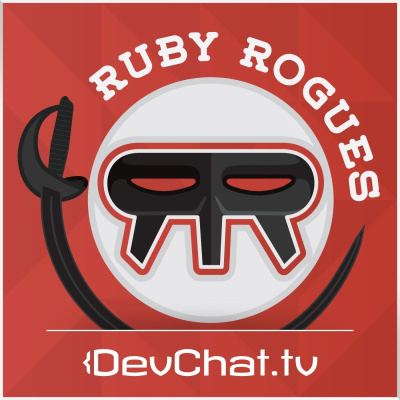Sinopse
All ruby related podcasts from Devchat.tv, including: - Ruby Rogues - My Ruby Story - Ruby Rants
Episódios
-
RR 441: Solidus with Alessandro Desantis
10/12/2019 Duração: 31minAlessandro Desantis is the director of Nebulab and is currently working on Solidus. After talking a little bit about how Nebulab got started, he describes what Solidus is. Solidus is a free, open source eCommerce platform built in Ruby on Rails that gives you complete control over your store. Three things that set it apart from other eCommerce platforms are that it is governed by a single company and that the focus is on quality and backwards compatibility. One of their biggest goals is to make Solidus streamlined, and Alessandro talks about how they handle it with the complex business logic involved in eCommerce. He talks more about the governance of Solidus and the different teams involved. Alessandro admits that Solidus has fewer features than some of its competitors, but this makes it very powerful and customizable. It can be tacked onto any Rails engine and you can pick and choose the things you want. Solidus was made with fewer features because of the unique nature of each eCommerce store. The creators
-
RR 440: Swagger and OpenAPI with Josh Ponelat
03/12/2019 Duração: 46minToday the panel discusses the difference between Swagger and Open API with Josh Ponelat. Josh details the difference between the two. Swagger is a set of protocols around describing restful APIs. Swagger was taken over by a company called SmartBear, who donated the donated the specification to the Open Linux Foundation, and that became the Open API. Swagger is the tooling surrounding these specifications. Open API is a standardized way to describe a restful API in a YAML file. Once you’ve got a YAML file to describe your API, you can use tooling like Swagger to leverage that and take it to the next level. Using the Open API process is useful for situations where you already have an API in place, but want to codify and document it so that it’s controlled. Then going forward, you won’t introduce contradictions and it remains consistent because it’s documented in a YAML file. The process leaves room for enhancement in the future as well.Josh talks about some of the benefits of standardizing your API and some of
-
RR 439: Human Powered Rails: Automated Crowdsourcing In Your RoR App with Andrew Glass
26/11/2019 Duração: 44minAndrew Glass is a Brooklyn based Rubyist operating a small independent devshop called Bang Equals. He has held many ‘enrichment jobs’, including being a ball person at US Open for 5 years, traveling for judging Guinness World Record attempts, and will be a balloon holder in the Macy’s Thanksgiving Day Parade this year. Today the panel is discussing his about his 2018 RailsConf talk, Human Powered Rails: Automated Crowdsourcing In Your Ruby on Rails App. In his talk, he shows the audience how to use Amazon Mechanical Turk. Amazon Mechanical Turk lets you post tasks, set a price point, and then people can go and complete the task. This is often done with tasks that can’t be done with machine learning and to train machine learning algorithms. In his talk he goes into What it is, how it’s used, and how we can use Ruby to automate the process. In his apps, he uses it for lead generation, qualification, enrichment, and some video and photo tagging. More specific uses include recording items from a picture of a shop
-
RR 438: Deviating from the Rails Core
19/11/2019 Duração: 43minToday Charles and Dave are discussing deviating from the Rails core. Dave doesn’t care for JavaScript frameworks or microservices as he believes that they add too much complexity. These things may become necessary when your project gets massive, but otherwise we shouldn’t jump to these as a first option. If you don’t need the frontend powerhouse features, you may want to see how far you can get with Rails and a minimal frontend. React may not always be the solution that you need. They discuss jQuery versus Stimulus. They both prefer jQuery over Stimulus as they find it less invasive and clunky, and it’s easier to drop things in. Dave talks about his experience with ElasticSearch and how he simplified it. They discuss using MongoDB and Mongoid. They agree that although these are not Ruby specific, they can help. Dave, however, has not found a need for them, while Charles has found that it gave him more advantages in his schema. He talks about some other advantages of MongoDB. Dave and Charles discuss the defau
-
RR 437: Deploying Rails Onto Kubernetes with Khash Sajadi
12/11/2019 Duração: 55minKhash and Kasia work for Cloud 66, a company started in 2012 with a goal to make Rails deployment simple and infrastructure easy to understand for application developers. As the company has moved towards containerization, they have integrated with Kubernetes. Khash talks about what distinguishes Cloud 66 from other platform as a service companies and why the company was started. He begins by talking about the structure of Heroku, how they own the entire stack down to the server, and how they are bound to a data center. Cloud 66 differs because they decided to break that unit economy from a data center to a server, so they don’t own the entire stack. Instead, they deploy what looks like an experience from Heroku onto your own server so you can go anywhere you want to go. They talk to the public API of those cloud providers within the data center that you choose that your account is in, and then provision, deploy, and maintain your application the way that you used to with Heroku, on that data center. Khash tal
-
RR 436: Determining Pricing with Michael Herold
05/11/2019 Duração: 45minMichael Herold is married to an economist and is a staff engineer at Flywheel where he writes Ruby programs to support PHP programs. He gave a talk at RailsConf 2018 about how to price a product. The frame for the problem is whenever you have a business idea, you eventually have to decide how to price it, and the pricing area is ripe for inefficiency on both customer and business ends. In his talk, he gave a simple framework based on the field of market research that helps give you an idea of what to price your product or service at called the Van Westendorp Price Sensitivity Meter, which is based off of talking with your customers about how they would value your product. He explains the difference between consumer surplus and producer surplus. The panel discusses other ways of determining pricing, such as basing your price off the price of a similar product. They discuss the pros and cons of different complex pricing they’ve seen. While complex pricing can be a turn off for many customers, it can also weed o
-
RR 435: Alternatives to Adding React with Graham Conzett
22/10/2019 Duração: 59minGraham Conzett has been a developer for 12 years. He has worked with Ruby and Rails for half of that, and currently works for a company that does large format touchscreens. Graham gave a talk at RailsConf 2018 called “Old School JavaScript and Rails” where he talks about the experience of JavaScript fatigue. The world of JavaScript changes very quickly, and sometimes it feels like there’s a new framework every week. Because there is no clear winner among these frameworks, many Rails developers feel compelled to reach for something like React. However, there are many strategies for doing JavaScript in Ruby and in Rails that existed before these frameworks, so you can accomplish what you want to get done without bringing one in. Remember that all of them can coexist side by side, so you don’t have to pick one strategy. The panel discusses the effect that adopting a new technology can have on the team, such as the learning curve and hiring people that specialize in it. To illustrate this, Graham talks about the
-
RR 434: Surviving Webpack with Ross Kaffenberger
15/10/2019 Duração: 01h23minRoss Kaffenberger is a software engineer at Stitch Fix and has been developing web applications for the past 12 years, mostly in Ruby and JavaScript. Today he and the panel are discussing how to survive Webpack. When many folks first encounter Webpack, they feel confused, overwhelmed, and don’t know how to get it to do what you want it to. In the latest version they tried to introduce some more sane default settings, but it is still a major change in technology. Ross talks about how his company transitioned Rails 5 to Rails 6 with the new Webpacker. His company chose to take an iterative approach and slowly migrated to Webpacker. His app was very JS heavy with a large number of libraries, many of which were not very Webpack friendly. They chose to separate out the vendor libraries into a separate bundle, that way they could contain each deploy. They still had to add some configuration, especially to make things available on global scope.As they started moving jQuery plugins over, sometimes the functionality w
-
RR 433: ShipLane with John Epperson
08/10/2019 Duração: 26minJohn Epperson has been doing ruby for 12 years and is a friend of Andrew Mason. He got into Docker a couple years ago and felt like something was missing, so he wrote Shiplane. He liked Docker because it was a promise that he could delegate a lot of the manual devops work to something else, and that something else was able to automate all of it. What he noticed was if you have a Docker thing in development and want to transfer it into production, there was no clear path to get a Docker item from development to production. The process wasn’t truly automated, so he created ShipLane in an attempt to automate it.ShipLane solves this problem by assuming that you have a box out there, whether it’s a VM or an actual physical box, and you have SSH access to it. It logs in, it makes sure you have Docker installed, and gives you the ability to actually take your development docker compose, and convert it to a productionized version. It also hooks in to Capistrano and replaces that with ShipLane commands. Right now Ship
-
RR 432: Stop Testing, Start Storytelling with Mike Schutte
01/10/2019 Duração: 40minMike Schutte is a fronted developer at TED conferences and was trained in code school at Turing in Colorado. He likes the idea of code as a communication tool, and in 2018 he gave a talk at RailsConf called Stop Testing. Start Storytelling. Today the panel is discussing what Mike means by storytelling in testing. In order to combat the hesitancy to start testing, Mike believes that changing your mindset to think away from the implementation details while deploying these tests can help them be more efficient. In short, if the test isn’t readable by a non-developer, then it’s not telling a story, it’s just writing code. The test is almost the first point of contact away from the source code, so if that’s unwieldy in a test it will be hard to use elsewhere in the application. We have an intuition for stories, so use tests in order to communicate the intent of what the application should do under certain conditions. If it’s hard to set that up in a succinct way then maybe it should be written differently.This vie
-
RR 431: Building a Consulting Business with Todd Kaufman
24/09/2019 Duração: 01h08minTodd Kaufman is one of the cofounders of Test Double, a software development consultancy that was started 8 years ago. Todd talks about how he got started with Test Double and how it grew. He and Justin started Test Double because he felt that a lot of consultancies didn’t align with what they thought was important. Most consultancies then didn’t focus on good software development practices, and instead focused solely on the process. They decided that they would put the developers first and foremost so they could solve hard problems.Charles talks about his experience with a consultancy, where he was fired after his project finished, and asks how Test Double does things differently. Todd talks about the importance of financial stability in a consultancy, and one way that Test Double accomplishes this is by being a completely remote company to cut out the cost of having an office,Todd shares their approach to the projects they take on. Their contracts are open ended and they tend to work with clients for a long
-
RR 430: Opal with Elia Schito
17/09/2019 Duração: 59minEpisode Summary Today’s guest Elia Schito has been a Ruby developer for 12+ years and works for Nebulab. During his career he looked for Ruby to JavaScript translators and found Opal. The panel discusses where Opal belongs within an app and when the compilation into JavaScript occurs. The main reason a person would want to use Opal is to avoid writing in JavaScript. Elia talks about the benefits of using Opal. One is that productivity is better in a language like Ruby. Also, if you’re working on a project that needs to get done quickly, it makes sense to use Opal so that your speed is not hindered. Elia talks about testing Opal with things like WebPacker and Hyperstack, and explains what Hyperstack is. Opal recently released a newer, bigger version, and Elia talks about the features of the new release. He details what kind of JavaScript it produces and how to hook it into your CICD, how to run it locally, and overall how to use the compiler. He talks about how to debug in Opal. He notes that during
-
RR 429: Mechanical Confidence with Adam Cuppy
10/09/2019 Duração: 01h12minEpisode SummaryAdam Cuppy is the cofounder and current chief operating officer at Zeal, web and mobile app consultancy. Today the panel is discussing the talk he gave at Rails Conf called Mechanically Confident. Adam has a hypothesis that confidence is not the result of belief alone but ingrained routine. The more routine, the more pattern, the more rehearsal applied to a given thing, the more confident you are with that thingThe history behind Adam’s theory stems from his background in theater and performing arts. The concept of rehearsal is commonplace in the performing arts, but not other industries. He talks about where rehearsal comes in for programmers and how he has noticed the patterns of senior developers. The panelists talk about where they see routine and rehearsal come into play with their workThe panelists wonder how do you avoid a stopgap from a slight change, and Adam relates it to some of the most rehearsed actors, improv actors. It’s important to rehearse everything you can, building a routin
-
RR 428: Arming the Rebels with Rails 6 Featuring David Heinemeier Hansson
03/09/2019 Duração: 01h16minSponsorsSentry use code “devchat” for $100 credit Sustain Our SoftwareAdventures in BlockchainPanelDavid KimuraAndrew MasonNate HopkinsCharles Max WoodWith Special Guest: David Heinemeier HanssonEpisode SummaryToday’s guest is David Heinemeier Hansson, the creator of Ruby on Rails and co founder and CTO at Basecamp. This episode is focused on the release of Rails 6. David talks about the process of getting from Rails 5 to Rails 6 and some of the new features and frameworks in Rails 6. David describes some of the new features as ‘magical, which some people don’t like. He believes that the ‘magical’ element is a good thing because it reduces the learning curve for newcomers, so you can less time studying and more time being productive. This is important because it allows people from other platforms to jump on. Rails 6 will provide users with more frameworks so that they do not have to build all of their own solutions to common problems. David delves into how Ruby goes against the grain by providing tools and ho
-
RR 427: Sorbet, a Type Checker for Ruby with Paul Tarjan
27/08/2019 Duração: 47minSponsorsSentry use code “devchat” for $100 credit DatadogReact Native RadioPanelDavid KimuraAndrew MasonWith Special Guest: Paul TarjanEpisode SummaryPaul Tarjan works for Stripe specializing in developer productivity. In the past, he has owned his own company and worked for Facebook. In today’s episode, the panel is talking about Sorbet, a gradual type checker for Ruby that Paul built. Paul talks about how Sorbet fits in the Ruby community and how it works. The two parts of Sorbet are the runtime type check and the static typecheck. Paul talks about how introducing Sorbet at Stripe has changed the way they approach coding. He talks about some of the performance impacts of adding Sorbet, how it differs from other type checkers, and how it was received in the Ruby community. Paul delves into how developers are notified if Sorbet fails a type check while checking a class. The panel discusses ways to convince reluctant team members that introducing a type checker like Sorbet will improve their code, and Paul tal
-
RR 426: Dockerized Development Environments with Julian Fahrer
20/08/2019 Duração: 58minSponsorsSentry use code “devchat” for $100 credit DatadogPanelDavid KimuraAndrew MasonCharles Max WoodWith Special Guests: Julian FahrerEpisode Summary Julian Fahrer has been a guest on Devchat shows before and recently did a workshop at RailsConf about Docker. He specializes in teaching people about Docker and has his own course, LearnDocker.online. Julian begins by giving suggestions for those considering Dockerizing their Rails applications. He talks about why Docker is a good choice to be used in a local development environment and gives some advice for those who might have trouble running Docker in development. He talks about where Docker fits within the development or production environment. He talks about synchronizing code between development and production and running tests. He advises listeners on how to get started with Docker. He talks about using a Docker registry to build and push images. They discuss how to deal with things once you move to production and how to use containers when considering
-
RR 425: Rails + Webpacker with Taylor Jones
13/08/2019 Duração: 41minSponsorsSentry use code “devchat” for $100 credit DatadogPanelDavid KimuraAndrew MasonNate HopkinsWith Special Guests: Taylor JonesEpisode SummaryTaylor Jones works remotely for Heroku in technical support. He talks about some of the most common issues he helps customers with and what issues he saw when Webpacker was introduced. The panel talks about their experience using Webpacker and how it has influenced their usage of React and Ruby. They talk about the importance of creating maintainable applications and the possible effects of using primarily new technology versus tried and true methods. It is important to keep architecture consistent, so that if you have to debug something old, you still know your way around. They discuss the forward progress in the Rails community and how the need for a JavaScript framework has decreased. They discuss improvements in adding elements from other languages into your code, especially since Webpacker added a way to manage JavaScript assets to the community. They discuss t
-
RR 424: Documenting Your Code
06/08/2019 Duração: 40minSponsorsSentry use code “devchat” for $100 credit DatadogPanelDavid KimuraNate HopkinsAndrew MasonEpisode SummaryToday the panel is talking about documentation. They begin by discussing what documentation is, where it fits within an application, and if the code documents itself. They agree that documentation starts in the comments to explain what you’re doing, but if that’s your exclusive method, then a refactor is in order. They talk about where to start with documentation and different ways they’ve done it. The panel talks about the importance of documentation, especially for people just joining a team. In addition to documenting the project itself, it is important to document what different libraries do and how to interact with them. They discuss where to put this kind of documentation. They talk about documenting patterns, best practices, and procedures in addition to the ‘how to’ of a project. The conversation turns to style guidelines, what they are, and how to keep them up to date. They talk about what
-
RR 423: The Well-Grounded Rubyist with David A. Black & Joseph Leo III
30/07/2019 Duração: 49minSponsorsSentry use code “devchat” for $100 credit Cloud 66 - Pain Free Rails Deployments: Try Cloud 66 Rails for FREE & get $66 free credits with promo code RubyRogues PanelCharles Max WoodAndrew MasonWith Special Guests: David A. Black and Joseph Leo IIIEpisode SummaryDavid A. Black has been a Ruby user for 19 years and has been writing books about Ruby for the last 14 years. Joseph spent 12 years in software and started the company Def Method Inc. Together, they co-authored the book The Well-Grounded Rubyist, which will soon have its third edition released. They give some of the history behind The Well-Grounded Rubyist. Joseph talks about his experience being brought into the project. David and Joseph talk about how The Well-Grounded Rubyist is different from other books on Ruby. This book is helpful because a lot of people begin by understanding Ruby more than Rails, and this book talks about ways to think about Ruby and understand how it’s structure. Joseph and David talk about how The Well-Grounded R
-
RR 422: Build Chatbot Interactions in Ruby with Daniel Pritchett
21/07/2019 Duração: 43minSponsorsSentry use code “devchat” for $100 credit Cloud 66 - Pain Free Rails Deployments: Try Cloud 66 Rails for FREE & get $66 free credits with promo code RubyRogues PanelCharles Max WoodAndrew MasonWith Special Guest: Daniel PritchettEpisode Summary Daniel Pritchett started doing Ruby in 2012. Lately he has been working on publishing a book on building Chatbots in Ruby using a framework called Lita and does infrastructure for a startup called Gremlin. Gremlin reaches out to servers and tries to find weak spots so that you can be proactive about solving these problems and be better prepared when fires do start. Daniel’s real purpose in joining the show today was to talk about his book Build Chatbot Interactions. Daniel talks about what he defines as a chatbot. His book teaches you how to program a chatbot with a dozen or so different chatbot skills. Daniel talks about his first community chatbot, @elvis on #memtech IRC, which picked up immediate contributions from local developers. Daniel istructs liste












